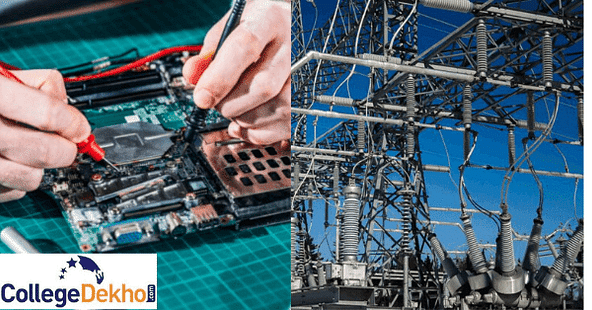Candidates interested in government job after B.Sc Electronics and B.Tech Electrical Engineering can check the list of government jobs and scope here.
- List of Government Jobs after B Sc Electronics & Average …
- List of Government Jobs after B Tech Electrical Engineering & …
- How to Choose the Right Job after B Sc Electronics/ …
- Higher Studies Scope after B Sc Electronics
- Higher Studies Scope after B.Tech Electrical Engineering
- Job vs Higher Studies after B Sc Electronics
- Job vs Higher Studies after B Tech Electrical Engineering

In India, Government jobs are the most sought after option for a graduate. It is because of numerous benefits that one receives like job security, benefits of government schemes, flexible working hours, job status, less stress etc. A candidate is eligible for a government job based on their graduation courses like B Sc , B Tech or Diploma. Most of the government organisations release vacancy notification based on the student's eligibility criteria. A candidate with a graduate degree and meeting the eligibility criteria can get a government job after qualifying for the relevant entrance examination.
Although there are many government jobs for a candidate with a specialised degree, many are not aware of most of the job vacancies and scope in the government sector. In this article, we have covered the list of government job scope for two most popular courses B Sc Electronics and B Tech Electrical Engineering
List of Government Jobs after B Sc Electronics & Average Salary
Check the list of Government Jobs after B Sc Electronics and average salary in the following table:
Job Role | Starting Average Salary |
|---|---|
ECIL- Trainee | Rs. 3.00 Lakhs to Rs. 4.00 Lakhs per annum |
Ircon International Limited- JE | Rs. 4.20 Lakhs per annum |
NTPC- Trainee | Rs. 4.00 Lakhs per annum |
ISRO- Scientist/Engineer | Rs. 12 Lakhs per annum to Rs 15 Lakhs per annum |
DRDO- Scientist | Rs. 3.00 Lakhs to Rs. 4.20 Lakhs per annum |
IT officer | Rs 4.00 Lakhs per month |
List of Government Jobs after B Tech Electrical Engineering & Average Salary
Check the list of Government Jobs after B Tech Electrical Engineering and average salary in the following table:
Job Role | Starting Average Salary |
|---|---|
State Electricity Board- Junior Engineer (JE) | Rs. 3.60 Lakhs per annum |
ISRO- Scientist/Engineer | Rs. 12 Lakhs per annum |
RRB- Junior Engineer (JE) | Rs 3.00 Lakhs to Rs. 4.80 Lakhs per annum |
NTPC- Trainee | Rs. 4.00 Lakhs |
BHEL- Trainee | Rs 6.00 Lakhs per annum |
Power Plant Engineer | Rs 5.50 Lakhs per annum |
Note: The above-average salary is for your reference. Actual salary may vary
How to Choose the Right Job after B Sc Electronics/ B Tech Electrical Engineering?
Following are the guidelines which will help you choose the right job after B Sc Electronics/ B.Tech Electrical Engineering:
Long term goal
Before you choose a job role or an organisation for yourself it is essential for you to analyse your long term career goal. Make sure that your job role and responsibility meet your career goals. Also, jot down the roles and responsibilities of a profession and challenges that you may face as a professional.
You must also analyse the opportunities for growth in an organisation and in a particular job role.
Skill Sets
Every job role or profession required candidates to have some skill seat in the beginning. There are some skills that a professional will have to learn in the later stage of their career for growth in career and a better pay scale.
You should analyse different skill sets required for different job roles before choosing a job.
Pay Scale and Additional Benefits
Salary is not the only factor to choose a job. However, it is an important factor to determine your standard of living. Clarity about the pay scale will help you plan and make important decisions in your life effectively.
Check the starting pay scale and the increment in pay scale after a certain year of experience. Ensure that your salary meets the standard amount paid in the market.
Apart from a decent pay scale, check other benefits that the organisation provides. It includes the PF, house allowance, incentives(if any), bonus etc.
Work culture
Before joining an organisation, research about the work culture. Flexible office timing, challenging job roles, collaboration among employees, and open for employee suggestions are some of the factors that you must consider while analysing the work culture of an organisation.
You can discuss the work culture with current and previous employees. There are also online platforms where you can read about the reviews about the organisation.
Higher Studies Scope after B Sc Electronics
Candidates can opt for Masters degree under Electronic specialisation after B.Sc Electronics. Some of the popular courses are as follows:
M Sc in VLSI
Masters in Industrial Electronics
M Sc Signal Processing
Click the link below to find out the list of colleges in India offering M Sc electronics course
Higher Studies Scope after B.Tech Electrical Engineering
After the completion of B.Tech Electrical Engineering studies, a candidate can appear in the GATE entrance examination and get admission in ME/ M Tech course in reputed institutes in India like IIT and NIT.
They can also apply for admission to other colleges in India that offer ME/ M Tech courses. A candidate can choose a course of specialisation of their choice. Some of the popular master's courses to opt after f B Tech Electrical Engineering are as follows:
M Tech. in Power System Engineering
M Tech in Aircraft Maintenance engineering
M Tech Instrumentation and Control
M Tech in Communications and Signal Processing
M Tech Power Electronics
Click the link below to find out the list of colleges in India offering M.Tech Electrical courses :
Job vs Higher Studies after B Sc Electronics
The electronics sector is one of the fastest-growing sectors in the world. The scope of the sector can be widely seen in the electronics industry. The application of B.Sc electronics branch can be widely seen in the telecommunication industry, signal transmission information processing, control systems, circuit design etc.
After the B.Sc electronics course, a candidate can either pursue higher education or get a job. Check the following table for Pros and Cons of Higher Education vs Jobs after B.Sc Electronics
B Sc Electronics Higher Education- Pros and Cons | B Sc Electronics Job- Pros and Cons |
|---|---|
|
|
|
|
Job vs Higher Studies after B Tech Electrical Engineering
Electrical Engineering is a core engineering branch that finds its application in Power Plants, Electricity board, Railway Sectors, Heavy Industries etc. B Tech Electrical Engineering candidates are offered a job in core companies or PSUs through GATE. If a candidate does not get a job in the core branch then they can try to get a job in one of the PSUs through GATE entrance examination
Check the following table for Pros and Cons of Higher Education vs Jobs after B Tech Electrical Engineering
B Tech Electrical Engineering Higher Education- Pros and Cons | B Tech Electrical Engineering Job- Pros and Cons |
|---|---|
|
|
|
|
For Latest Educational News and Information, Stay tuned to CollegeDekho!
Are you feeling lost and unsure about what career path to take after completing 12th standard?
Say goodbye to confusion and hello to a bright future!

Was this article helpful?





















Similar Articles
PSU Opportunities After Qualifying CSIR NET Exam
PSU Recruitment Process for CSIR NET-qualified Candidates
CSIR NET 2025 Application Form Correction: Check Dates, Process, Details to Edit
CSIR NET 2025 December Session: Steps to Retrieve Application Number & Password
CSIR NET E-Certificate: How to Download, Validity, Documents Required, Instructions
How to Prepare for CSIR NET in 3 months